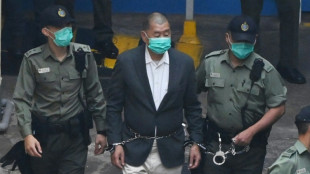
-
 Munsey leads Scotland to 207-4 against Italy at T20 World Cup
Munsey leads Scotland to 207-4 against Italy at T20 World Cup
-
Venezuela's Machado says ally 'kidnapped' after his release

-
 Japan restarts world's biggest nuclear plant again
Japan restarts world's biggest nuclear plant again
-
Bangladesh poll rivals rally on final day of campaign

-
 Third impeachment case filed against Philippine VP Duterte
Third impeachment case filed against Philippine VP Duterte
-
Wallaby winger Nawaqanitawase heads to Japan

-
 Thailand's Anutin rides wave of nationalism to election victory
Thailand's Anutin rides wave of nationalism to election victory
-
Venezuela's Machado says ally kidnapped by armed men after his release

-
 Maye longs for do-over as record Super Bowl bid ends in misery
Maye longs for do-over as record Super Bowl bid ends in misery
-
Seahawks' Walker rushes to Super Bowl MVP honors

-
 Darnold basks in 'special journey' to Super Bowl glory
Darnold basks in 'special journey' to Super Bowl glory
-
Japan's Takaichi may struggle to soothe voters and markets

-
 Bad Bunny celebrates Puerto Rico at Super Bowl, angering Trump
Bad Bunny celebrates Puerto Rico at Super Bowl, angering Trump
-
Seahawks soar to Super Bowl win over Patriots

-
 'Want to go home': Indonesian crew abandoned off Africa demand wages
'Want to go home': Indonesian crew abandoned off Africa demand wages
-
Asian stocks track Wall St rally as Tokyo hits record on Takaichi win

-
 Hong Kong sentences pro-democracy mogul Jimmy Lai to 20 years in jail
Hong Kong sentences pro-democracy mogul Jimmy Lai to 20 years in jail
-
Bad Bunny celebrates Puerto Rico in joyous Super Bowl halftime show

-
 Three prominent opposition figures released in Venezuela
Three prominent opposition figures released in Venezuela
-
Japan PM Takaichi basks in historic election triumph

-
 Israeli president says 'we shall overcome this evil' at Bondi Beach
Israeli president says 'we shall overcome this evil' at Bondi Beach
-
'Flood' of disinformation ahead of Bangladesh election

-
 Arguments to begin in key US social media addiction trial
Arguments to begin in key US social media addiction trial
-
Gotterup tops Matsuyama in playoff to win Phoenix Open

-
 New Zealand's Christchurch mosque killer appeals conviction
New Zealand's Christchurch mosque killer appeals conviction
-
Leonard's 41 leads Clippers over T-Wolves, Knicks cruise

-
 Patriots-Seahawks Super Bowl approaches as politics swirl
Patriots-Seahawks Super Bowl approaches as politics swirl
-
Trump says China's Xi to visit US 'toward the end of the year'

-
 Real Madrid edge Valencia to stay on Barca's tail, Atletico slump
Real Madrid edge Valencia to stay on Barca's tail, Atletico slump
-
Malinin keeps USA golden in Olympic figure skating team event

-
 Lebanon building collapse toll rises to 9: civil defence
Lebanon building collapse toll rises to 9: civil defence
-
Real Madrid keep pressure on Barca with tight win at Valencia

-
 Dimarco helps Inter to eight-point lead in Serie A, Juve stumble
Dimarco helps Inter to eight-point lead in Serie A, Juve stumble
-
PSG trounce Marseille to move back top of Ligue 1

-
 Two prominent opposition figures released in Venezuela
Two prominent opposition figures released in Venezuela
-
Hong Kong to sentence media mogul Jimmy Lai in national security trial

-
 Lillard will try to match record with third NBA 3-Point title
Lillard will try to match record with third NBA 3-Point title
-
Vonn breaks leg as crashes out in brutal end to Olympic dream

-
 Malinin enters the fray as Japan lead USA in Olympics team skating
Malinin enters the fray as Japan lead USA in Olympics team skating
-
Thailand's Anutin readies for coalition talks after election win

-
 Fans arrive for Patriots-Seahawks Super Bowl as politics swirl
Fans arrive for Patriots-Seahawks Super Bowl as politics swirl
-
'Send Help' repeats as N.America box office champ

-
 Japan close gap on USA in Winter Olympics team skating event
Japan close gap on USA in Winter Olympics team skating event
-
Liverpool improvement not reflected in results, says Slot

-
 Japan PM Takaichi basks in election triumph
Japan PM Takaichi basks in election triumph
-
Machado's close ally released in Venezuela

-
 Dimarco helps Inter to eight-point lead in Serie A
Dimarco helps Inter to eight-point lead in Serie A
-
Man City 'needed' to beat Liverpool to keep title race alive: Silva

-
 Czech snowboarder Maderova lands shock Olympic parallel giant slalom win
Czech snowboarder Maderova lands shock Olympic parallel giant slalom win
-
Man City fight back to end Anfield hoodoo and reel in Arsenal


Nepalis fight TikTok ban in court, or ignore it entirely
When Nepal suddenly announced a ban on TikTok last year, lawyer Sunil Rajan Singh was determined to fight what he said was a government effort to hide its wrongdoings.
The hugely popular video-sharing platform has faced restrictions in several countries for allegedly breaking data rules and for its supposed harmful impact on youth.
Last week the United States became the latest nation poised to ban the app outright, unless Chinese parent company ByteDance agrees to divest it.
Efforts to restrict access to TikTok have prompted vocal opposition wherever they have been attempted but especially so in Nepal, where the platform had been used to mobilise anti-government demonstrations.
Some Nepalis have skirted the ban entirely by accessing TikTok via virtual private networks (VPNs), which use a remote connection that obscures their location. Others like Singh are determined to fight.
"The government's move is against freedom of speech and expression guaranteed by Nepal's constitution," said the attorney, who is leading a legal challenge to the ban in the Himalayan republic's top court.
"On TikTok the public would learn about corruption, financial embezzlement and other immoral activities of leaders," he told AFP. "That was not helpful for the government."
Nepal's communications minister justified last November's ban by accusing the platform of spreading content that damaged the country's "social harmony".
The announcement came days before a huge rally called by a prominent businessman who was using TikTok to organise a campaign demanding the reinstatement of Nepal's monarchy.
The case before the Supreme Court is due to be heard next week with a decision expected later this year.
TikTok is one of the most popular social media platforms on the planet with more than one billion users.
Its explosive growth has given its content creators and influencers an immense audience, and its editing features and AI-powered algorithm have proved particularly attractive.
But the platform has also been blamed for spreading disinformation, and ByteDance's alleged ties to the Chinese government have prompted alarm in foreign capitals.
Multiple countries have sought to tighten controls on TikTok, and it was banned about four years ago in neighbouring India.
AFP, along with more than a dozen fact-checking organisations, is paid by TikTok to verify videos that potentially contain false information.
- 'TikTok gave us hope' -
Nepal's ban was condemned not just by free speech advocates like Singh but the owners of popular accounts whose lives were transformed by the platform, which had about 2.2 million users in the country.
Sangmo Bomjan, 28, was running a lucrative business reselling children's clothes on the platform that began when the Covid-19 pandemic put her husband out of work, saving her household from financial ruin.
"We were worried, but TikTok gave us hope," she told AFP.
Orders kept the couple busy packing clothes even at night to deliver across the country, and they were able to earn more than $2,000 every month.
After the ban, Bomjan used a VPN to keep posting videos to her account, circumventing the block on TikTok imposed by local internet service providers.
But her orders have shrunk to less than half of what they were before the ban and her videos get a fraction of their earlier viewers.
"They do not reach my customers in remote areas. They don't know how to use VPNs," she said.
The collapse in her earnings prompted her husband to migrate to South Korea, sending back money to support Bomjan and their two children.
- 'So many people were earning' -
Industry workers told AFP last year that Nepal's TikTok ban had torpedoed a market worth an estimated $5 million each year for advertisers and content creators, and which was set to grow rapidly.
After joining the platform in 2018, twin sisters Prisma and Princy Khatiwada built a following of nearly eight million on TikTok with videos of their synchronised dance routines.
Their popularity has netted them endorsement deals and modelling contracts in music videos and advertisements.
Both sisters still post to their individual accounts but their recent videos have been watched just tens of thousands of times on average -- miniscule compared to the 70 million views one of their biggest viral hits got before the ban.
"Where we stand today is because of TikTok... so many people were earning and getting opportunities through it," Prisma told AFP.
"We are hopeful that the ban will be lifted."
V.Said--SF-PST



